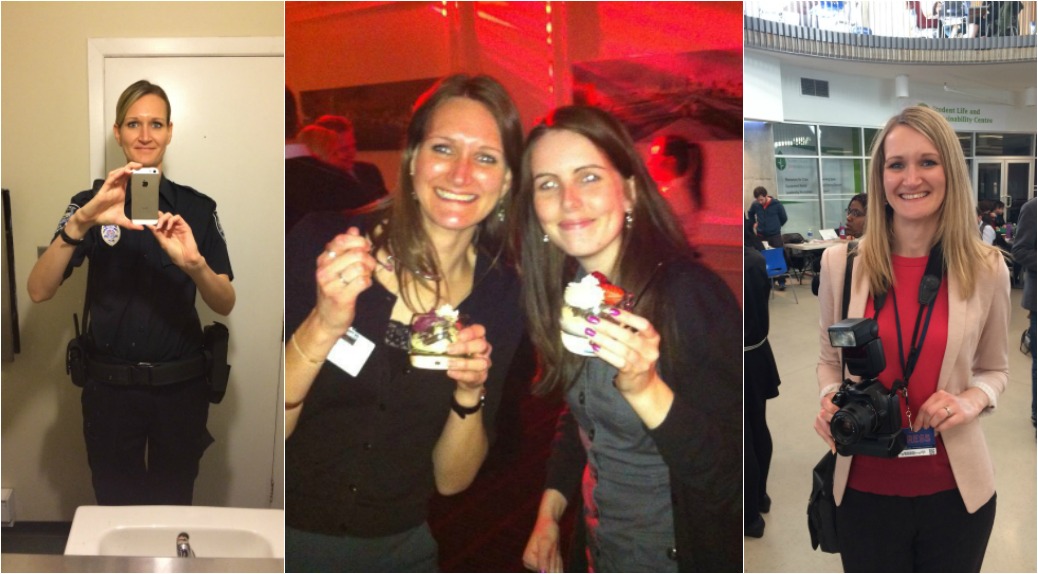
Can you get a good job without a college degree? Is that even possible?
The university recruitment office would have you believe you can’t. And for some people and some careers a four-year college degree (and the debt that goes with it) is 100% non-negotiable.
But for many of jobs, that college degree isn’t absolutely necessary.
My best friend of 20 years dropped out of college and now has a well-paid corporate job, working alongside people with four-year degrees and even M.A.s. Here’s how she found a great job without completing college.
After completing a very intense 2-year college-prep program, graduating with honors, being granted a scholarship and feeling convinced I would go on to pursue a Master’s program to become a college professor someday, I just quit college.
After three years of undergrad, when the end of my last semester was over, I left with full intentions to return after a break and complete my degree, then power through to grad school.
At first, I wanted to take time and evaluate what I was doing at school: it was so expensive, I worked and paid for most of it myself, and the longer I was there the more convinced I became that I didn’t want to grow up and be an Artist.
My only option seemed to be to pile on years of education in order to carve out a living I’d be comfortable with. Aside from that, like a lot of 20-somethings, the thought of planning my entire career RIGHT NOW was really scary.
Alternately, my mind was filled with the image of having a happy home, sunny weekends, good friends and the notion that I’d have a job that was enjoyable and helped me create a comfortable lifestyle.
Ten years later, I know:Having a degree is fantastic, but not always necessary to achieve the things you want in life. Share on X
But enough about me, back to you…you want to find a career, college isn’t really your thing. You’ve been in college now for quite some time, but it seems that you may not finish, or another opportunity comes along OR you plain old fall in love with an idea that you know will take you down the right path for your life.
The truth about how to get a good job without a college degree
How to tell your family you’re dropping out of college
-
Talk to them often about your intentions.
-
Try to express yourself without becoming too defensive – chances are they might not be supportive. Many people, parents included, think that college is the Only Key to Success.
-
Tread lightly and smartly and they will appreciate that you took time to think about it and that you let them be involved, even if they don’t agree with your motives.
-
If you want to leave college without a plan, consider talking to your guidance counselor, a favorite professor or your parents. Maybe you just need to change your major?
How to find a job without a college degree
Consider pulling together a resume with the help of someone you trust, sending it out, lining up an interview or two and maybe even getting a new job before you drop out of school. Having employment is going to make this new life much easier because you won’t be living off student loans.
Think about what you like to do- what your goals are, how can you get there? (This shouldn’t be too difficult. Remember? You already talked to your parents about it.)
-
You may just get the job, they can only say no.
-
Interviewing takes practice. You should have some ideas about the questions that might be asked of you and more importantly, you should wrangle your confidence, know your value and have some answers at the ready.
-
There may be an entry level job in that organization. If you show up to the interview motivated and willing to compromise you might just wind up working in that museum after all. You won’t be a curator, but you will get to work under the marketing director, or security division. You can make a modest paycheck and spend your lunch break walking the galleries!
How to talk about your lack of a degree in an interview
Be sure that your intention to learn and grow with a company is known, and find out if the company you want to work for is offering that. What if they ask about your degree? Be honest, but not brutally honest.
Don’t say, “I left college because getting an Art degree started to seem like bunch of BS.” It is still true to say, “I want an opportunity to get hands-on work experience, grow with a company, and be sure that when I return to school for a degree, it’s the degree I want.”
In my case, I didn’t finish college because I wanted something that in my mind was better than what my undergrad degree would have offered me. In hindsight, I can see that I just wanted to pave my own way, even if it was more difficult.
Ten years after leaving college, I’ve worked my way from coffee girl/receptionist to defining my own position as the first ever marketing coordinator at an environmental company.
Not all glamour, but sacrificing some income up front gave me the opportunity to grow with a company, learn an industry, work on my creative skills and pick up on some aspects of business I’d never have been privy to in a larger company. I have also made some incredible friends.
How to get your dream job without a college degree
-
Show your employer your skills, and ASK for projects you think you can do well that will highlight those skills.
-
Find out if your company offers any professional development programs and take advantage of them.
-
Take a community education course or enroll in a night class that pertains to your interests and career intentions. And keep doing it.
-
Read everything you can get your hands on about your goal.
-
Find a way to stay current on any software that might pertain to your skills.
-
Join a professional group of people that do what you want to do and network your butt off.
-
Look for part-time internships doing something you love.
-
Find a mentor.
Have any of you skipped the college route? Any questions for Darcie?












Absolutely amazing post! It's so essential that people see & understand that there are options out there for them – I worry that people aren't pursuing their dreams or even their interests because they're concerned about how it'll 'look'. Hopefully everyone sees that there's always another choice (or five!) if they're not happy where they are.
Yaaay, a post for me! <3 I dropped college to stick it out at a job that I would eventually quit to leave the entire profession of child care. Now I am trying to carve a career as a full-time food/travel/event writer. Trying to branch out and grab the attention of big wigs is my next step <3 Thanks for this post!
I don't want to rain on anyone's parade, but many employers favor someone with a degree, even one that's unrelated to the job, because it shows a certain level of commitment and stamina. The reality is that many people drop out of college because they lack the very determination that might make them able to pursue an alternate career path. It's interesting that you cited not wanting to plan out your entire career as a reason for dropping out, because in fact dropping out often narrows a person's choices considerably. Although I guess that's one way of not having to plan out your entire career — drop out of college and the decision is often made for you.
Obviously not everyone is doomed to fail if they don't get a college degree, but in today's job market it sure does increase the possibility. I heartily congratulate you, Darcie, on finding success in your own way, but I would seriously caution anyone thinking of going this route if they can manage to stick it out and get the piece of paper.
BTW, I say this as an employer — and as someone who is currently trying to promote a very deserving employee and meeting with significant resistance from my management because the employee never bothered to finish his degree; he has 90% of what's required too, but in this case "almost" doesn't count.
Love! Useful information/reminders about career growing – with or without your BA.
Haha, now I think we need a post on 'Get a Job with your PhD' because that's just as challenging.
Audi,
In no way do I feel that my choices in life have been limited due to my incomplete undergraduate degree. I have been fortunate and I have worked very hard, in addition to taking time to fortify some new skills that became of importance after starting my job. By doing this I was able to increase my earnings and benefit my employer.
In fact, I am incredibly happy that the last three years of what would have been an undergrad and graduate degree, in which I would have spent tens of thousands of dollars, was spent learning about myself and what I wanted from my life. I didn't leave college, degrees in hand, feeling like my only option was to take a job in my studied field or else I’d be a failure.
The most important idea I want to convey today is that everyone has choices when it comes to career and education. There are alternate paths to success, where you can learn, grow and enrich yourself while also earning a living. There are many people who simply can't afford college, and if they are willing to work their way up, they can make their career goals happen with the right employer. If they are as fortunate as I am, they will also someday be able to work on starting their own businesses, hopefully employing creative, hardworking people. Yes and Yes is about seeing things differently, swapping routes in life every now and then and finding success and joy there, with or without a college degree.
Well said Darcie! I don't have a degree behind me but started my own business 4 years ago and I've never been happier. I love it so much it doesn't actually feel like work!
How did you start your own bussiness? What was it like to know what exactly you wanted n the steps you took to get where you r know?
Great post, Darcie. I did something similar in that I left college because it was expensive and I wasn't sure what I was getting out of it (if you're someone who knows what you're passionate about studying at age 20, great! I wasn't that person). I found an entry-level job at a great company and worked my way up to technical business analyst in just over three years. I've found that once I proved myself to be a hard-worker and a leader, my lack of degree didn't matter. Most people at work assume that I do have one, anyway – and I find that in technology, not having a degree matters less because there's so much that you can teach yourself outside of the classroom.
Incidentally, I'm going back to school now, but I actually know what I'm interested in studying this time around so I'm doing it for MYSELF and not for my parents or future job prospects.
I do have a Bachelor's Degree in English, but I got it because I wanted an education, not so I could get a better job. I want to be a writer and artist, to create my own career from scratch and that doesn't require a degree, but I don't think I could do it without college to open my mind. I currently work for $10 an hour at a job that has nothing to do with my field while I try to get my career started, and I'm ok with it. College isn't bringing me any monetary benefits at the moment, but I don't regret it one bit.
I live in Washington DC, which is considered to be an over-educated city. Most working professionals have master's degrees, so there is definitely a bias against those who have not earned bachelors degrees in the professional arena. That being said, I have a degree, and while I know that my degree got me in the door and provided superficial "proof" to my employer that I could be counted on to get my job done, what actually enabled me to succeed are the things Darcie lists above. My college education did not specifically prepare me for the professional world at all. I attribute my professional success more to my personality than to my education: willingness to work hard, even when recognition is lacking, desire to learn and take on new responsibilities, humility, dependability, etc. In fact, the culture of academia is so different from the professional world that I actually had difficulty adjusting. For example, in college I was free to, and encouraged to express my political views-at work that's not such a great idea!
Yeah, I actually had an employer tell me he was hesitant to promote me because I didn't have a degree, and that he always looked for it, not for experience, but to prove that someone could stick things out and finish them. So I went back to school in my 30s and got my bachelor's (and got the promotion when I enrolled). I am totally and completely down with anyone who makes their own path in life, but instead of being defensive about it, I think it's more mature of you to realize that some employers or paths ARE going to be closed to you, and be ready for that (or to work around it). You may find yourself out of work in your 40s and want to start something new, and this may become an obstacle later. I am actually super-proud of going back and finishing at a later age, and really appreciating the time and effort I spent getting there. Yahoo, we all win!!!
I agree w/ you completely. Most employers I've interviewed with/ talked to couldn't care less if a person finished a degree. What they were more concerned about was that their employees knew how to do their job and could "play well with others" (the exception to this are the medical and legal fields – they pretty much require a degree for everyone from the receptionists on up). Generally speaking though, finishing a degree that you're only moderately happy about is only going to guarantee that you get saddled with massive student loan debt and get stuck working in a field that doesn't fuel your passions.
I would always recommend that someone take a step back and really evaluate if college is what they want before they default to pursuing a degree "because that's what you're supposed to do after high school". Degrees are expensive and not always necessary, so it's better to pursue one purposefully only when one has a particular reason for getting a degree (ie: to learn a specific skill, gain a specific job, etc).